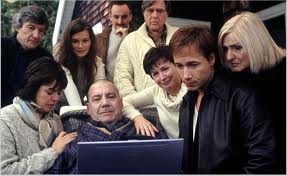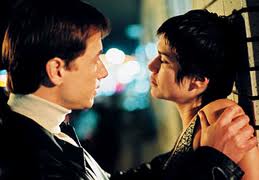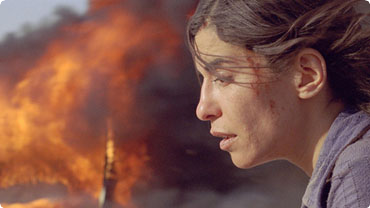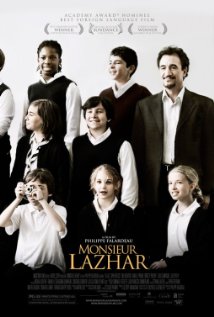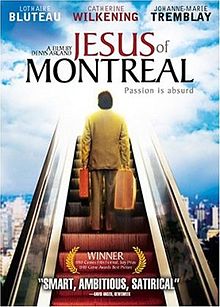 Jesus of Montreal was directed by Denys Arcand, who also directed The Decline of the American Empire and The Barbarian Invasions, and some call these three movies his trilogy. Although Jesus of Montreal won the Prize of the Ecumenical Jury at the Cannes International Film Festival, compared to The Decline of the American Empire (nominated for the Best Foreign Language Film Academy Award) and The Barbarian Invasions (won the Academy Award), its popularity in Japan was one step below the others, and I hear it is difficult to get it on DVD. All three works are certainly very well-made, but I feel that Jesus of Montreal is my favorite of the three. This movie intellectually explains Christianity, is a humorous love story with charming characters, has interesting story development, and is original and artistic. I think this movie has elements that appeal to Japanese people.
Jesus of Montreal was directed by Denys Arcand, who also directed The Decline of the American Empire and The Barbarian Invasions, and some call these three movies his trilogy. Although Jesus of Montreal won the Prize of the Ecumenical Jury at the Cannes International Film Festival, compared to The Decline of the American Empire (nominated for the Best Foreign Language Film Academy Award) and The Barbarian Invasions (won the Academy Award), its popularity in Japan was one step below the others, and I hear it is difficult to get it on DVD. All three works are certainly very well-made, but I feel that Jesus of Montreal is my favorite of the three. This movie intellectually explains Christianity, is a humorous love story with charming characters, has interesting story development, and is original and artistic. I think this movie has elements that appeal to Japanese people.
Quebec, as represented by Montreal, is unique within Canada. Because it was originally a French territory, the official languages even now are English and French, and the predominant religion is Catholicism. Resentment towards the federal Canadian government is strong, and they have a unique socialist system that was established by means of an election. Until recently, there was quite a violent anti-Canada independence movement, and even still, there is about equal support for the Quebec sovereignty movement and for the party in favor of staying within the Canadian government. My friend who is a lawyer from Quebec said his neighborhood when he was a kid was poor, and riots happened quite frequently.
First, Quebec intellectuals, as represented by Denys Arcand, underwent a revolution to break free from the influence of Catholicism, and chose Marxism to support their revolution. However, they gradually became disillusioned with Marxism, too. This disillusionment is symbolized by the hospital seen in The Barbarian Invasions that is run with socialist principles, where helping patients is secondary to bureaucracy and patients are always left in the hallways.
Jesus of Montreal criticizes Christianity as a religious authority, but the tone is very smart, refreshing, and full of charm. In this movie, there are two plays within the story, and the plays within the main story make up about one-third of the whole movie. I almost stopped watching this movie because the first play within the story was too absurd and boring, but I think the boringness is Denys Arcand’s criticism of some untalented artists who arrogantly smile and say, “Can you understand the greatness of this piece of art?” when they make boring piece like this one. The second play within the story was very beautiful, and I was unexpectedly drawn in.
This movie starts with Daniel—an actor who is extremely talented, but not interested in mainstream commercialism, and does underground theatre work—being asked by a priest of a big Catholic Church to produce a play that depicts the life of Jesus. The priest says, “Do it however you like,” so he seems like a very supportive, understanding, and kind person. Daniel recruits a woman who works at a homeless shelter and was an upperclassman at his drama school, an actor who works as a stand-in in pornographic movies, an actor who seems difficult and only partakes in plays that he really likes, and a young actress who appears in cheap-looking commercials that try to attract viewers using only her body and is looked down on as “someone with no acting ability”; with this crew, Daniel creates a wonderful play, and he receives high praises from the audience and critics. The actors working with him realize their talents as actors for the first time, and they are excited and happy.
However, due to Daniel’s interpretation of Jesus as, “a man with a strong and kind spirit and not the Son of God, but the child of a Roman soldier and Mary,” the priest gets pressure from a superior in the Catholic Church; worried that he may lose his position, the priest tries to discontinue the running of the play. Through this, it becomes clearer and clearer that the priest who appeared to be respectable at first glance, is in fact quite unholy. The movie ends with a tragedy that is caused by the conflict between the protesting audience and the church trying to stop the play.
I think Daniel symbolizes what Jesus would look like if he were born in modern times. The actor who performs in the boring play at the beginning of the movie, when praised, points to Daniel saying, “There is an actor better than me,” resembling John the Baptist’s prediction of the arrival of Jesus. The way the four actors cast their jobs aside to work with Daniel resembles how believers at that time threw away their assets to follow Jesus. The actress who specializes in commercials and is scornfully told, “Your acting ability is only your ass,” gives unconditional love to Daniel, who treats her with respect—particularly reminiscent of Mary Magdalene. The moment Daniel dies is like when Jesus is on the cross. The miracle of Jesus bringing back the dead and giving sight to the blind happens after Daniel’s death. Also, after Daniel’s death, there is a scene where the talented lawyer proposes that the two actors that followed Daniel closely create a theatrical company to convey Daniel’s great achievements. These two actors seem to symbolize Jesus’s apostles, such as Peter or Paul. “We are happy to start a theatrical company if it is not commercial and it has direct interaction with the audience, as was Daniel’s intention,” the two answer, demonstrating a sincere desire to carry on the spirit of Jesus; but something like, “This could be a great success,” also glimmers in their eyes. This may be an omen for what their future may hold, parallel to how the Christian church that started with a modest feeling became corrupt as a big political organization after the Roman Empire officially recognized it.
Anyhow, this movie is very enjoyable and it resonates with the heart. I’m glad I didn’t stop watching in the first 2 minutes…

 Director Denys Arcand, who made
Director Denys Arcand, who made 